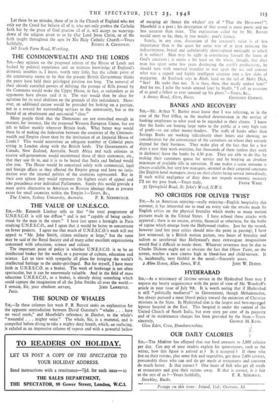THE SOUND OF WHALES
SIR,—In these columns last week F. R. Barratt seeks an explanation for the apparent contradiction between David Gunston's "whales . . have no vocal cords," and Masefield's reference, in Dauber, to the whale's "mournful . . . mighty voice." The whale, Sir, is a mammal, and is compelled before diving to take a mighty deep breath, which, on surfacing, is exhaled as an impressive column of vapour and with a powerful bellow
of escaping air (hence the whalers' cry of " Thar she blo-o-ows I"). Masefield is a poet ; his description of that sound is more poetic and no less accurate than mine. The explanation called for by Mr. Barratt would seem to lie, then, in two words: poet's licence.
Surely, in any case, discussion of the creature's voice is of less importance than is the quest for some way of at least reducing the indiscriminate, brutal and unbelievably short-sighted onslaught to which it is subject? Man may be right in considering himself the finest of God's creations ; it seems a bit hard on the whale, though, that after man has spent some few years destroying the earth's productivity, he should turn with renewed brutality to tear apart the sea and convert what was a superb and highly intelligent creature into a few slabs of margarine. As Starbuck says to Ahab, hard on the tail of Moby Dick, "See! He seeks thee not. It is thou, thou, that madly seekest him!" And for me, I echo the words uttered later by Stubb, " I call ye assassins of as good a fellow as ever spouted up his ghost."—Yours, &c.,


































 Previous page
Previous page